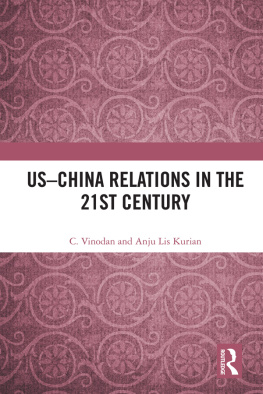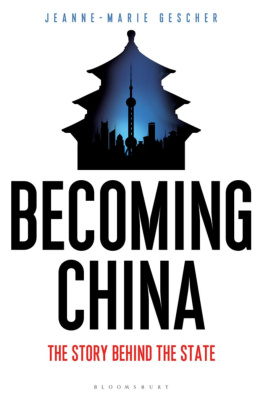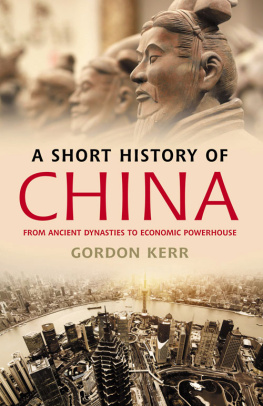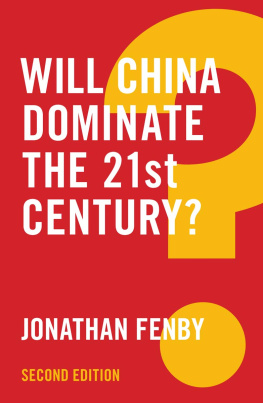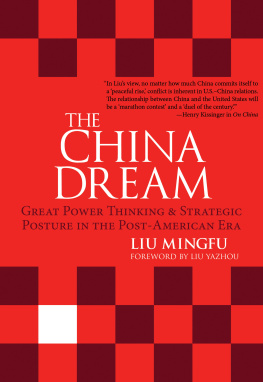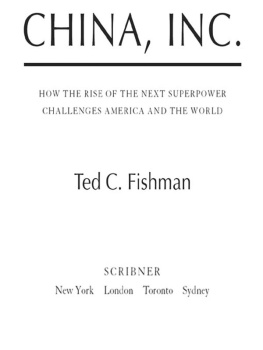CHINA IN THE 21ST CENTURY
WHAT EVERYONE NEEDS TO KNOW
CHINA IN THE 21ST CENTURY
WHAT EVERYONE NEEDS TO KNOW
2nd Edition
JEFFREY N. WASSERSTROM
With Contributions by
MAURA ELIZABETH CUNNINGHAM


Oxford University Press is a department of the University of Oxford.
It furthers the Universitys objective of excellence in research, scholarship, and education by publishing worldwide.
Oxford New York
Auckland Cape Town Dar es Salaam Hong Kong Karachi
Kuala Lumpur Madrid Melbourne Mexico City Nairobi
New Delhi Shanghai Taipei Toronto
With offices in
Argentina Austria Brazil Chile Czech Republic France Greece
Guatemala Hungary Italy Japan Poland Portugal Singapore
South Korea Switzerland Thailand Turkey Ukraine Vietnam
Oxford is a registered trademark of Oxford University Press in the UK and certain other countries.
Published in the United States of America by
Oxford University Press
198 Madison Avenue, New York, NY 10016
Jeffrey N. Wasserstrom 2010, 2013
All rights reserved. No part of this publication may be reproduced, stored in a retrieval system, or transmitted, in any form or by any means, without the prior permission in writing of Oxford University Press, or as expressly permitted by law, by license, or under terms agreed with the appropriate reproduction rights organization. Inquiries concerning reproduction outside the scope of the above should be sent to the Rights Department, Oxford University Press, at the address above.
You must not circulate this work in any other form and you must impose this same condition on any acquirer.
The Library of Congress has cataloged the first edition as follows:
Wasserstrom, Jeffrey N.
China in the 21st century: what everyone
needs to know/Jeffrey N. Wasserstrom.
p. cm.
Includes bibliographical references and index.
ISBN 9780195394474; 9780195394122 (pbk.)
1. ChinaHistory21st century. I. Title.
II. Title: China in the twenty-first century.
DS779.4.W376 2010
951.06dc22
2009045415
ISBN for 2013 edition: 9780199974962
1 3 5 7 9 8 6 4 2
Printed in the United States of America on acid-free paper
(TO THE FIRST EDITION)
I owe debts of gratitude to many individuals, beginning with the students who have taken my classes and the people who have attended the talks on China Ive given in some fourteen different countries located on four continents over the course of the last two decades. The questions they have asked me helped me figure out which ones to address in this volume. I am enormously grateful to Tim Bent and Dayne Poshusta at Oxford University Press, and the anonymous readers of the book proposal they solicited, for providing me with guidance in refining my list of questions. I also want to thank Tim, the editor in charge of the project, for his unvarying support, unfailing good humor, and the work he did on tightening up the books prose; and Dayne, for bringing a sharp set of eyes to the manuscript at a key stage in its development.
I want to thank the following friends and colleagues who helped me greatly by answering my inquiries, listening to me try out ideas, sharing unpublished works, or reading and commenting on one or more chapters at very short notice: Susan Brownell, Tim Oakes, Tim Weston, Lisa Claypool, Susan Fernsebner, Lee Haiyan, Sara Friedman, Benjamin Read, and Kate Merkel-Hess (who deserves a special separate expression of thanks, since various parts of the book were shaped by work she and I did on coauthored commentaries). Going even further beyond the call of duty (and perhaps even friendship), Vanessa Schwartz, Rob Culp, Peter Zarrow, and Kate Edgerton-Tarpley made time to read entire drafts of the manuscript (again at very short notice) and gave me valuable suggestions about how to improve it.
I am grateful to many colleagues, first at Indiana University and now at the University of CaliforniaIrvine, for conversations that have contributed to my understanding of China and the ways that it is similar to or different from other countries. There are too many people to list, but Id be remiss not to mention Maria Bucur, Jeff Isaac, Jeff Gould, Nick Cullather, Mike Grossberg, John Bodnar, Sue Tuohy, Scott OBryan, Scott Kennedy, Jeff Veidlinger, Ben Nathans, Mark Roseman, Kumble Subbaswamy, and Michael Curtin (among those formerly or still at IU) as well as, at UCI, Ken Pomeranz, Vinayak Chaturvedi, Bob Moeller, Emily Rosenberg, Yong Chen, Guo Qitao, Dorothy Solinger, Laura Mitchell, Kavita Philip, and Jennifer Munger.
I also want to thank everyone involved with the China Beat blog, which was launched at UCI in January 2008. Participating in that venture has provided me with an invaluable continuing education, both about the PRC and about writing, while also offering a wonderful example of what can be accomplished by a group ready to blur or ignore completely the divides that separate, often unnecessarily, the work done by graduate students as opposed to faculty members, academics as opposed to freelance writers with a scholarly bent, and so on. I am grateful to all the China Beat contributors (too numerous by this point to list), and especially to Kate Merkel-Hess, Ken Pomeranz, Maura Cunningham, Miri Kim, and Susan McEachern for being such good collaborators on the blog and the related book, China in 2008: A Year of Great Significance, which grew out of it.
I owe a special thank you to Nicole Rebec, for giving a complete early draft of this book a careful and thoughtful read for style. And I am very grateful to Nancy Toff, for first getting me involved in the operations of OUPs wonderful New York office.
I want to thank as well Pankaj Mishra, Geremie Barm, Timothy Garton Ash, Alec Ash, Prasenjit Duara, Harriet Evans, Mark Selden, Timothy Weston, Mary Gallagher, Liz Perry, Gail Hershatter, and Barbara Mittler for conversations or e-mail exchanges we had during 2009 on issues associated with topics covered in this book, which they may by now have forgotten but that shaped my thinking on key issues. In the acknowledgments to an earlier book, I thanked the editors at various general interest periodicals whose comments on short pieces I had worked on for them helped me make the transition from writing just for academics to writing for the public at large. I remain in their debt, and I now want to add a few new names to that list: Joan Connell, Josh Burek, Kate Palmer, Liam Fitzpatrick, Colin McMahon, and Nick Goldberg.
I am grateful as well to Michael Freeman, the inspiring teacher who taught me the first things I ever needed to know about China, back when I was a freshman. And the final person I want to thank is, as always, Anne Bockfor the usual reasons, plus in this case for all she does to help keep me aware of the difference between things that everyone needs to know about China and things that I simply find interesting about the country.
(TO THE NEW EDITION)
This new edition would not be appearing were it not for the efforts and goodwill of two people. One is Tim Bent of OUP, who has been a tireless supporter of the book from day one and green lighted the idea of updating it. The other is Maura Elizabeth Cunningham, who graciously agreed to join me in the sometimes daunting task of writing new material dealing with the dizzying swirl of events that took place in China during the years following the first editions appearance. I owe her a very large debt of gratitude; she more than earned the With Contributions By credit she has on the title page, and along with all she did on the new questions and answers that are found sprinkled through later chapters, she did much to improve the flow of earlier parts of the book.
Next page


